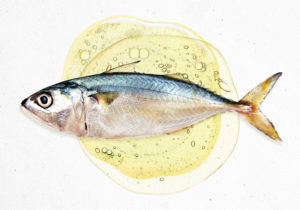
Quell Oil vs. Krill Oil
What is the Difference Between Quell Oil and Krill Oil?
What does it mean to be getting omega-3 fatty acids into your diet? For many people, they may, in the very least, recognize that omega-3’s derive from fish but beyond that may not have much of an idea as to what that wholly means. Despite the name of ‘fatty acids’ which some could misconstrue as a negative thing, these omega-3’s are an overlooked dietary supplement that is important for our physiological needs.
For the most part, as long as you have a rich and diverse diet of fruits, meats, and vegetables, your body is receiving many, if not all, the dietary requirements it needs to appease the body and ensure healthy function. But perhaps you’re not too keen on fish, and because you’re neglecting fish from your diet, your body may find itself operating at inadequate levels of omega-3 fatty acids. Now there’s absolutely a work-around to not incorporating fish into your diet: omega-3 supplements.
You’ve likely seen bottles of the stuff sold at your grocery or wellness store. These supplements can go a long way in ameliorating the lack of essential fatty acids in place of dietary restrictions. However, not all fish oils are created equal; lately, krill oil has been spouted off as a richer substitute for fish oil supplements, but it’s important to review the science behind them.
 What are the Omega-3 Fatty Acids
What are the Omega-3 Fatty Acids
There are three primary omega-3 fatty acids that scientists study: alpha-linolenic acid (ALA), eicosapentaenoic acid (EPA), and docosahexaenoic acid (DHA). As mentioned previously, there are specific vitamins, minerals, dietary needs, etc. that we can only acquire through the foods we eat. While our bodies are vastly equipped at converting substances from one form to another for utilization, there’s still the ever-present demand of eating to make up for what our bodies can’t make.
ALA is what scientists call an essential fatty acid since it can only be derived from food. Inversely, EPA and DHA aren’t essential fatty acids (don’t be mistaken that they aren’t important because they are), which only means that our bodies can make them. From ALA, our body can convert this acid in our livers into EPA and from EPA to DHA. However, the rate of conversion in the liver causes very minimal amounts of these substances, which is why dietary supplements are the only practical way of increasing levels of omega-3 fatty acids in our body. As a side note, the fatty acids don’t directly derive from fish and their oils. It all stems from what the fish eat. At the origin, microalgae synthesize the acids, then plankton eat the algae, and then fish eat the plankton. This goes to show the intricate nature of how involved a process it takes to create these acids.
What Omega-3 Fatty Acids Do for the Body
After introducing the main omega-3 fatty acids and where they derive from, let’s refocus and explore their role in the body. When either food or supplements rich in ALA, EPA, or DHA are consumed, the body, in turn, digests these fatty acids. Through digestion, the fatty acid is incorporated into specific molecules that enter the bloodstream through the lymphatic system. Unique proteins called lipoproteins transport the fatty-acids, or lipids as they’re named after having been digested, to various organs where chemical transformations occur.
The Omega-3 fatty acids are vital because of their role in being a crucial component in forming phospholipid layers. DHA, for example, contributes largely to sperm, retina, and brain cell structures. In other words, the cells in our bodies have cell membranes that allow for things to actively and passively diffuse through if the right biological conditions are met. Without phospholipids, our cells would lose their structure, and cellular contents would pour out, and you’d die. Additionally, beyond just being integral structural blocks for our cells, they provide us energy and help create eicosanoids — special chemical signallers involved in our pulmonary, immune, endocrine, and cardiovascular systems.
Omega-3 Deficiencies
When someone finds themselves deficient in essential fatty acids, the body responds by manifesting rough and scaly skin and flare-ups of dermatitis. Furthermore, it’s not uncommon for hair to become dry and brittle, for fingernails to crack, feelings of excessive thirst to manifest, troubles sleeping as well as difficulties concentrating begin, so on and so forth.
To combat any omega-3 deficiencies in the body and stave off the symptoms listed above, turn to dietary supplements. But not just any omega-3 supplement.
Krill Oil
Created from harvesting large quantities of Antarctic Krill, a small like crustacean commonly eaten by whales, krill oil is found to have high levels of EPA and DHA. These fatty acids, derived from krill, are easily digestible and utilizable than regular fish oil. It’s speculated that the variations in fatty acid chains between fish and krill oil are the reasons why krill oil has been shown to produce higher levels of omega-3’s in the body. However, no definitive study exist claiming outright that that’s the case. Conversely, no other studies have affirmed that krill oil lacks the “fishy taste” described with many fish oil supplements.
If anything at all, Krill oil certainly has a place and use as a dietary supplement but should be considered secondary to quell fish oil.
Quell Fish Oil
When you think of fish oil supplements, it would be wrong to classify Quell Oil with the rest. This oil, through the process of CO2 extraction, uses less heat and no chemical solvents, is a cleaner substance.
Since oxygen isn’t used and CO2 is the driving force of separating the fatty acids from the fish oil, there are no tagalong oxygen-thriving microorganisms existing in the oil. This ensures a level of purity, along with a lack of chemical preservatives and solvents.
Furthermore, Quell Fish Oil has higher concentrations of EPA and DHA. Whereas regular fish oils have about 30% omega-3’s (12% EPA and 18% DHA) and 70% of varying mixtures added, Quell has 75% omega-3’s in its oil, leaving less room for nonessential fillers.
Not All Omega-3’s Are the Same
It’s easy to understand how many people often overlook or neglect dietary needs during the constant hustle and bustle of life. Juggling family, careers, social lives all make it hard to slow down and focus on yourself. Those who can catch a breath and look inward often find that life’s been moving so fast that they haven’t necessarily been taking care of themselves as much as they should be. It’s never too late to make positive changes and plant the seeds for a healthier and happier you down-the-road. If you’re feeling sluggish, tired, or just not quite operating at the capacity you once were, then consider that your body may be telling you something. It’s important to listen to yourself.
At Vitality Aesthetic & Regenerative Medicine, we provide pharmaceutical-grade supplements by Douglas Labs. No lifestyle is too fast or busy for us to coordinate and create a health plan that will help you in the long run. Take a moment to better yourself so that later on, you can have many greater, healthier moments.

